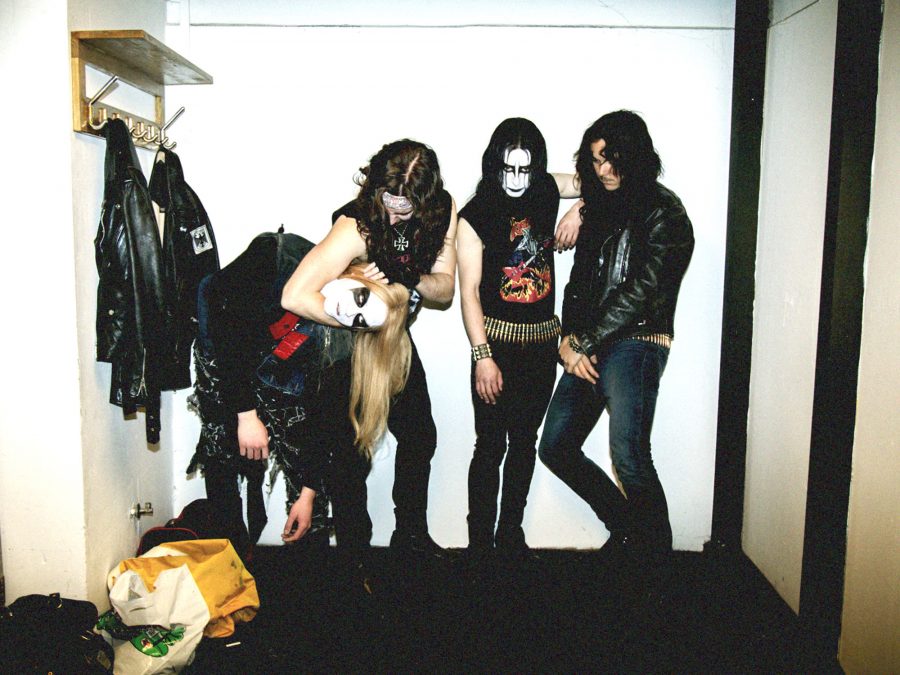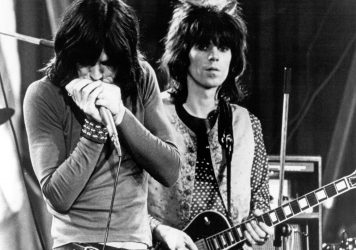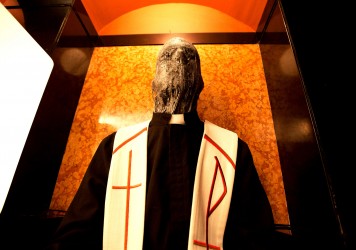Jonas Åkerlund attempts to debunk the various myths surrounding the Norwegian Black Metal scene.
‘Based on truth, lies… and what actually happened’ declares the playful title card at the start of director Jonas Åkerlund’s genre-hybrid music biopic Lords of Chaos, a film ‘inspired by’ the doorstop text of the same name that documented the Norwegian black metal scene’s rise to international infamy.
In the late 1980s, a small but influential wave of black metal groups carved an aesthetic out of being abrasive, unpalatable and ‘evil’. At the heart of this foundation myth lies Mayhem, the band that helped set in stone the nascent style’s look (faces daubed in black-and-white ‘corpse’ paint), sound (louder, darker, faster, stronger) and attitude (anti everything).
Mayhem also, actively and inadvertently, dragged the whole dark brotherhood screaming into the spotlight when their members were implicated in a series of church burnings throughout Norway – but their place in music history was assured when bassist Varg Vikernes (Emory Cohen) murdered guitarist, founder and genre ringleader Euronymous (Rory Culkin) in August 1993.

Åkerlund has history with metal – he once played drums for the Swedish group Bathory – but he has since forged a career as a versatile music video director, just as likely to work with Lady Gaga, Madonna or Beyonce as he is with Metallica. In Lords of Chaos, too, Åkerlund isn’t wedded to one genre, taking in gruesome, true-crime nastiness, teen-movie hedonism and the sort of post-modern mischief that recalls Michael Winterbottom’s Madchester romp 24 Hour Party People.
A cheeky, knowing narration by Culkin (“We were world famous, all over Oslo”) provides irony-fuelled propulsion through Mayhem and Black Metal’s origin stories, as Euronymous forms a band, parties hard and forges a creative partnership with morbid-to-the-max vocalist Dead (Jack Kilmer). It’s all good fun – until it isn’t. Dead soon lives up to his stage name, taking his own life in Mayhem’s dingy dosshouse in the country in a scene that is shocking and stomach- turning in its quiet, ultra-violent frankness.
When Euronymous discovers the body, he incorporates the tragedy into the twisted mythology of Mayhem itself – setting in motion the band’s escalation towards its self-destructive destiny. Åkerlund presents this death unvarnished, attempting to de-fetishise the events that were quickly remoulded into larger-than-life legend.
To do this, Lords of Chaos exorcises the genre’s ‘evil’ reputation. Culkin finds an undercurrent of vulnerability in the role of Euronymous’ arch provocateur. Conversely, Cohen’s Varg is a baby- faced hanger-on, prone to tantrums and triggered by anxieties related to identity, masculinity and authenticity. In other words, he’s the exact type of try-hard true believer who might take shock-rock doctrine all too seriously.
For all the film’s posturing, Åkerlund and co-screenwriter Dennis Magnusson’s assessment of the Norwegian black metal scene is, ultimately, damning. There is something inherently, undeniably ridiculous about middle class kids giving the finger to their Christian-majority country by dressing up as corpses, posing in graveyards and embracing a confused ideological concoction of Satanism, neo-paganism and Nazism. But there’s also nothing more dangerous than a group of young men with something to prove.
Published 25 Mar 2019
Metal’s most notorious genre gets the rock-biopic treatment.
Darkly humorous, shockingly violent. A spine-chilling Spinal Tap.
A puckish, pointed parable of youth culture pushed to the extreme.

Natalie Portman plays a jaded pop star in director Brady Corbet’s cynical meditation on the price of fame.

When Mick Jagger and co took the stage 50 years ago, no one imagined the show would not go on.

By Anton Bitel
An indulgent and original horror bonanza from auteur-in-the making, Rob Zombie.